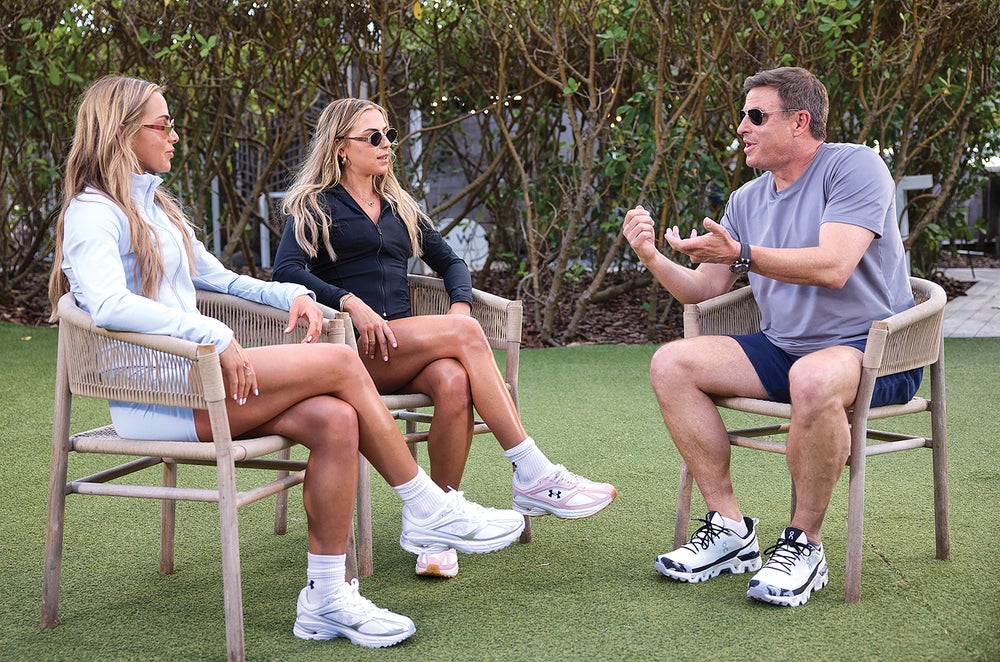How to Develop the Mindset for a Billion-Dollar Success, According to Raising Cane's Founder Todd Graves was turned down by every bank in town when he started. Here, he sits down to share his mentality on success, leadership and building a billion-dollar brand.
By Jason Feifer Edited by Frances Dodds
This story appears in the July 2025 issue of Entrepreneur. Subscribe »

When Raising Cane's opened a new restaurant in Miami, it hired local influencers to hype it up. That included two of the city's buzziest names — Hanna and Haley Cavinder, twins who rose to fame while playing basketball for the Miami Hurricanes, and cofounded the TWOgether fitness app and Hustle Beauty brand for athletes.
Recently, we asked the twins what entrepreneur they'd most like to talk with. They circled right back to that chicken restaurant — and said they'd love to meet Raising Cane's billionaire founder, Todd Graves. They'd seen his business from the outside, but they wanted to understand it from the inside. And Graves, who believes that partnerships are the key to success, was eager to meet and learn from them too.
So we brought the three of them together for a conversation. In turn, they drew up a game plan for growth — in business and in sports.
This conversation was part of a new series we call The Playbook, produced in partnership with Sports Illustrated. We pair entrepreneurs with entrepreneurial athletes for career-spanning conversations. Here's an edited version of their conversation; you can watch the full video here.
Related: 5 Work Ethic Lessons Entrepreneurs Can Learn From Elite Athletes
Haley Cavinder: When you started Raising Cane's, did people understand what you wanted to build?
Todd Graves: I got turned down by every bank in town, because it was a weird concept back then: Just chicken-finger meals. Other restaurants were adding more items to add more sales. The only model I could think of was In-N-Out Burger — which primarily sells hamburgers — but nobody in Louisiana, where I started, had heard of that.
But I just believed in myself. I said, "If you can serve a 'craveable' meal consistently, over and over and over, it's going to be a success."
So I knew I had to take it into my own hands. I worked in oil refineries, I worked as a boilermaker, I worked in commercial fishing in Alaska — all to make money for this business. The fishermen in Alaska could see me working so hard for this chicken-finger dream, and they'd tell me, "You're going to make it." That was my first encouraging group.

Haley: Once you got going, what was the hardest part?
Todd: When we started, we didn't really know what we were doing. We were open seven days a week — and we still are. But back then, the college students I hired wouldn't show up to work. So I'd call friends, call family: "I need you to come help me cover this shift." I didn't do much sleeping. We were open every night until 3:30 a.m.
By the time we got out, it'd be 5:30, and then we had to be back opening at 8:30 every morning.
Haley: Jeez.
Todd: There is not a balance of life at a startup. You have to put 100% into it. It's why I started Cane's when I was y'all's age. I opened up at 24, and at that time I could devote everything. It was that drive, that passion. Look, I profited $30 my first month, and I was thrilled. Because it meant I could pay my people, I could pay my vendors, I could pay rent. That's when I knew this was going to be a success.
The next hard phase was going from one restaurant to two. I didn't know how to build teams. I got as much advice as I could, but it was more about learning through trial and error. I burned through people. I felt bad about that, not knowing what I was doing. Then I learned to get the most out of people and be able to coach 'em and lead 'em to where they became managers.
Now we have 75,000 crew members, and I have a platform to teach them. For most of them, Raising Cane's is their first job. So I tell them: "Work hard. Have fun. Let's deliver quality product. Let's earn our money."
Haley: Darn, you make a good coach, too!
Hanna Cavinder: You played football, correct? I feel like that started with the athlete mindset.
Todd: A hundred percent. I learned leadership through sports. For example, when someone does something wrong in business, leaders might think, Oh, I'll talk to them about that in a couple days. But coaches don't do that! They course-correct right then.
Haley: In the moment.
Todd: And the culture is: Everybody's always trying to get better. Mistakes don't mean you're bad. We have a culture where it's okay to make mistakes — but we need to learn from 'em.
How has playing basketball helped you with starting and growing your businesses?
Hanna: We learned consistency and discipline. You have to show up every single day, regardless of the highs and lows.
Haley: We also learned how to get the most out of a group of people. When you all have one common goal, it doesn't matter what someone's past is, or where they come from. You just ask: How can we all accomplish this? Also, recognize that we all have different strengths and weaknesses. That's true even for Hanna and I, but we have one goal: to be successful. And you can't fake it. If you feel like your coach is just saying empty things to you, you don't want to show up for them. You need people to think, I want to show up and do this because they really care about me.
Todd: That's true. The crew's happier. They're working better. It affects quality. It affects everything else.
Hanna: Also, we learned how to respond to things outside our control. It's like, "Okay, the coach didn't play me. I can't control that. So what can I control and still have success?"
Related: Why Every Athlete Should Think Like a Startup Founder

Todd: You're years ahead of your time. I literally tried to control everything and make everything so perfect. One of the biggest lessons
I learned was: Concentrate on progress rather than perfection. For example, I wouldn't release my first training manual because I kept thinking, I've got to make it better. But people were like, "Hey, just do version one. Then work on that." That was good advice.
You've built a great community for your businesses. What is your secret sauce for bringing people together?
Haley: When we started our health and fitness businesses, we thought a lot about having a purpose. And that purpose is to help young girls. That allows us to stay happy and in a good mindset.
Hanna: That helps us through hard times, too.
For example, we both had an eating disorder — but we were able to turn it into a positive for other people by making an app to help them eat better. It was like, "We're going to impact a little girl, or somebody who's struggling in life, and that's a win in itself."
Todd: That's purpose.
Haley: That's the passion that keeps you going.
Todd: Look, if you love what you do, you'll do it till the day you die. In business, people often value money and wealth more than purpose. That's why so many great entrepreneurs sell out early on. Then their company is bought by private equity, and it doesn't have the same values. You lose that special founder deal.
People ask me, "Hey, what's your endgame?" I'm gonna grow old and die with this business, and the kids are gonna take it on and keep those values going, and then hopefully their kids, and we'll just keep those values going forever.
Hanna: There's never an endgame.
Todd: I love that.










